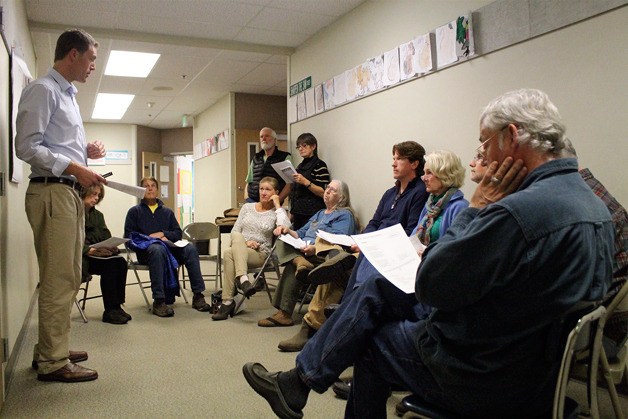Noise at rural event centers was the primary concern for about 80 residents who attended the county’s third and final rural lands public meeting.
Organized by Island County Planning and Community Development, the meeting was Tuesday night at South Whidbey Elementary community room and people were eager to talk shop when it comes to noise from businesses in rural Whidbey areas, particularly weddings.
Langley resident Maro Walsh said she had to shut down her private life in 2013 due to noise generated by the Comforts of Whidbey, a winery and rural event center on Witter Road.
“Rural event centers are all about a matter of scale and being in the right location,” Walsh said. “They really don’t belong in neighborhoods. They belong on bigger properties where they don’t have neighbors.”
Others felt differently about the matter, such as Langley resident Crispin Roberts, who lives nearby the Comforts of Whidbey.
“If you look at everything that has transpired with what the Comforts have done, they have a first-class place,” Roberts said. “I think economic growth is mandatory. If we want to have a life here, we need to have people moving to the island for a reason.”
County planners split the crowd into five small groups and led discussions from worksheets which covered a range of topics. The planners wrote down on paper the concerns and thoughts of attendees, which became a roadmap to issues such as rural event noise, tourism, commercial activities and accessory uses on agricultural land.
Commissioner Helen Price Johnson and Keith Higman, the county’s newly appointed interim planning chief, rotated from group to group to monitor the discussions.
The county is utilizing the community’s input to help revise the county’s Comprehensive Plan, which will steer development over the next 20 years, by hosting meetings where the public has ample opportunity to voice their thoughts. The county also mailed out surveys to randomly selected addresses zoned rural. 
Similar meetings were held in Coupeville on Oct. 21 and Oak Harbor on Oct. 22.
Group discussions began with weighing the pros and cons of tourism on the island, how tourism may disrupt rural character, and ways to achieve a balance between tourism and still maintaining rural character. One group, which was mostly in favor of tourism, also discussed in-depth the definitions of tourism and the scale and activities in which it applies.
The talks then shifted to commercial activities held on agricultural lands and how they contribute to the county’s rural character, and whether they disrupt that character.
The much awaited topic of the night were the issues surrounding rural event centers.
Noise generated by weddings, reunions, and other similar temporary gatherings have become a hotbed for criticism and controversy.
Walsh said in her discussion group attendees in favor of economic development felt event centers should be allowed to locate their business wherever they want because of the benefits that come from tourism. Walsh and Langley resident Betty Snyder felt that the rural event centers would be permissible if they were used on a much smaller scale.
“They can still go ahead and produce as much wine as they want, they can have a wine tasting room, and they can sell their wine,” Snyder said.
Walsh said that big event centers should not be located in rural neighborhoods.
Roberts felt the Comforts are moving in the right direction by recognizing the issues raised by the community and moving their events indoors.
Roberts’ friend, Mark Papritz, said he lives slightly closer to the event center than Roberts. He holds a different view on the matter.
“I love Crispin. We have talked and agreed about a billion things, but I have to disagree with some things,” Papritz said. “I think this is such a beautiful place that we live and we don’t need to give away so much. I think we can have a lot of these things, but it’s all about scale. The weddings were very, very loud.”
Papritz said he understands that the Comforts are working toward bringing their events indoors, but was also aware that they’re proposing a number of weddings for the future, which will inevitably lead to people outside making noise.
“I’m all for tourism, but we can be very smart about this at a proper scale,” Papritz said.
Potential solutions for mitigating the noise included creating a buffer, such as a forest surrounding the event center, relocation, increased enforcement and the time of day when the events are held.
The Comforts of Whidbey proposed a draft law which reads as follows: wineries are permitted to host short-term events which include food and wine festivals, art shows, culinary, tourism events, reunions, weddings and other temporary gatherings. Wineries are allowed to host up to 12 events per year involving 75 or fewer attendees and can include outside activities, and up to five events involving 150 attendees and also can include outside activities. Events that are restricted indoors are allowed without number or size restrictions except for building occupancy limitations, according to the documents. Outside noise during indoor events such as amplified music or voices are permitted as long as it lasts no more than two hours and ends before 7 p.m.
Higman said the results and feedback from the meetings will be posted to the planning website as soon as they are compiled.
A previous version of this story mischaracterized what wineries are permitted and not permitted to do under Island County Code. Wineries do not have a specific Island County code. All properties, including wineries, that seek to host events must meet regulations for rural event centers and/or small-scale recreation and tourist use. The statements were taken from a draft that were proposed by a single winery but not enacted.


